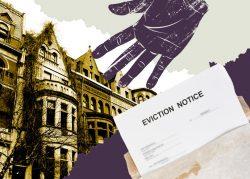In-person housing court is quite nearly back and when it is, order will supposedly rule.
After a year and a half of hearings by video, New York City Housing Court will reopen for in-person appearances as early as mid-October — supposedly without the usual chaos.
Pre-pandemic, the borough courthouses were notorious for hours-long lines to get in, jammed hallways, and take-a-number waits. The revamped experience promises schedules and capacity limits set to stem the spread of Covid and tenants’ related fears.
As many as six courtrooms will hear two to six cases per hour, said Edward Josephson, attorney at Legal Aid Society, to limit the number of litigants inside.
Last Monday, Sept. 13, the courts started scheduling cases filed after Sept. 1, including nonpayment suits, for virtual intake appearances that will assign attorneys to tenants.
The first of those cases was held Tuesday, said Office of Court Administration spokesperson Lucian Chalfen, and in three weeks, the earliest in-person cases will begin.
The amendments come as lawmakers and tenant advocates and lawyers sent a letter Monday to the Office of Court Administration and Gov. Kathy Hochul, urging the office to put off in-person appearances. Their argument is that the number of Covid cases in New York City is still high.
Read more


The letters’ 40+ signatories argued that reopening the courts would subject communities hit hardest by Covid — poor New Yorkers and people of color — to exposure in the courts.
“We cannot enable a court reopening that will undoubtedly fuel a resurgence of sickness and death in these areas,” said the letter’s authors. “Tenants and legal workers cannot and should not be asked to return to such buildings at this time.”
But the court spokesperson noted that only lawyers will be asked to appear — on “a single occasion.”
“Hyperbolic assertions help no one,” Chalfen said of the claims that the policy change would lead to sickness and death. “Particularly litigants who have waited more than a year for their day in court.”
Josephson said the hope is that most tenants will not have to attend court in person. After a virtual intake appointment in which tenants are assigned a lawyer, he said tenants can meet with that attorney virtually going forward.
Cases involving emergency rental assistance — an application to the program is a defense against eviction — or hardship declarations, another defense, will not require in-person appearances.
“Worst-case, only lawyers will need to appear in person,” Josephson wrote in an email.